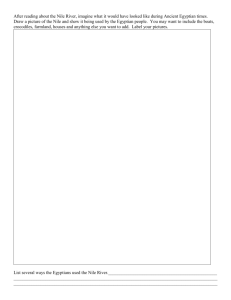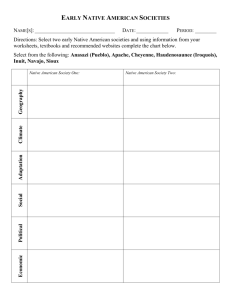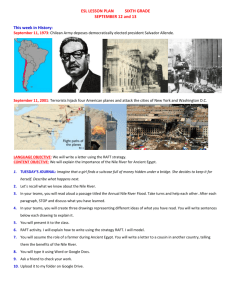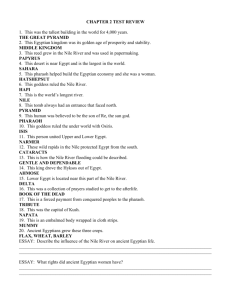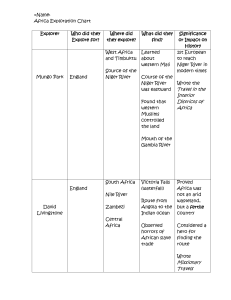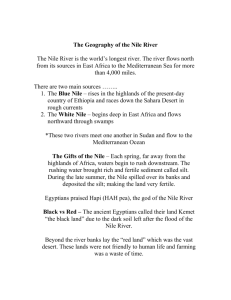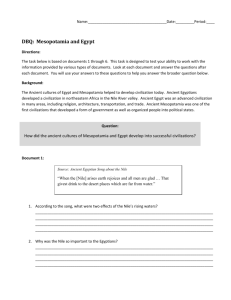6th Grade Social Studies
advertisement
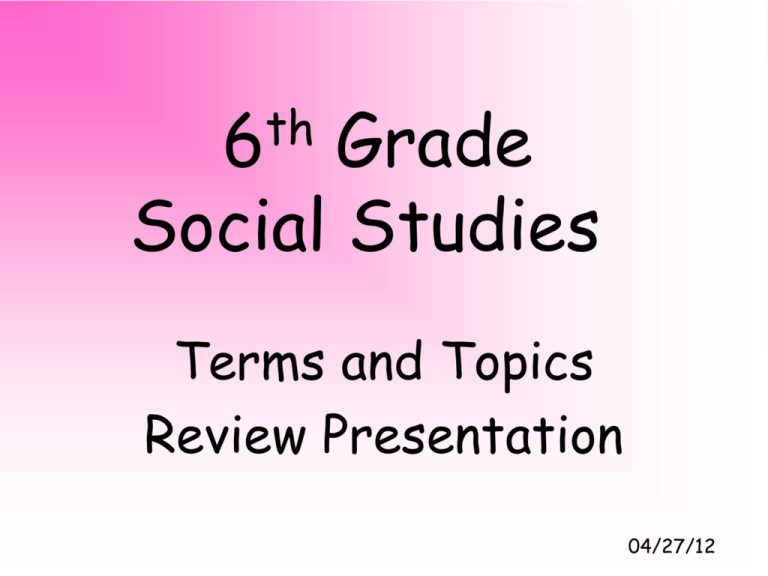
th 6 Grade Social Studies Terms and Topics Review Presentation 04/27/12 Nebuchadnezzar • The king of Babylon in Mesopotamia who built the Hanging Gardens for his wife. Nile River The Nile is a major north flowing river in northeastern Africa, generally regarded as the longest river in the world. Egypt is the “gift if the Nile.” Nile River Delta is the delta formed in Northern Egypt (Lower Egypt) where the Nile River spreads out and drains into the Mediterranean Sea. It is one of the world's largest river deltas Nomads Nomads are people who travel around from place to place without having a permanent place to live. Oligarchy • a small group of people who together govern a nation or control an organization. • Sparta was governed by an oligarchy. Origins of the Name: Kentucky Derived from the Languages of the Native Americans who lived in the lands before it became the state of Kentucky. Parliament England's system of government made up of the House of Lords and the House of Commons. Power to Collect Taxes The Local, State and Federal levels of Government have the power to collect taxes. Population Density Amount or number of people in a given area of land. For example how many people live within one square mile. Rural areas would show less density in population than urban/suburban areas. Pre-historic people In ancient history these are the people who lived before written records. These people were referred to as hunter/gatherers, nomads and cavemen Pre- vs. PostPre: Before Pre-war: before the war. Post: After Post-War: after the war Primary Source Secondary Source A primary source is a document, speech, or other sort of evidence written, created or otherwise produced during the time under study. Primary sources offer an inside view of a particular event. Examples include: Original documents: autobiographies, diaries, e-mail, interviews, letters, minutes, news film footage, official records, photographs, raw research data, speeches Creative works: art, drama, films, music, novels, poetry Relics or artifacts: buildings, clothing, DNA, furniture, jewelry, pottery Secondary sources provide interpretation and analysis of primary sources. Secondary sources are one step removed from the original event or "horse's mouth." Examples of secondary sources: Britannica Online encyclopedia (online) American National Biography (database) literary criticism analyzing a play, poem, novel, or short story magazine or newspaper articles about events or people political commentary analyzing an election or politician (via Lexis-Nexis database) textbooks Pros and Cons Is democracy the best form of government? • Arguments for and against, Yes, because… • Advantages & disadvantages, or • Criticisms & defenses Advantages are… of some particular contention or position. No, because… Disadvantages are… Pharaoh • Pharaoh is a title used for the ancient Egyptian rulers. Physical Features vs. Human Features • Physical features include landforms, bodies of water, climate, natural vegetation and soil. •Human features include buildings, dams, bridges, farms, cities and towns, roads, and changes made to physical features. Physical Map vs. Political Map Physical Map shows physical features. Mountains, Rivers, Plains, Deserts, and Seas. Political Map shows Human features. Towns, Cities, States, Countries and Roads. Marco Polo Born September 15, 1254) Venice, Italy (disputed) Died on or after January 9, 1324 Venice • Marco was a trader and an explorer from the citystate of Venice. He was one of the first “Westerners” to travel the “Silk Road” to China. He later wrote a book on his travels called “The Travels of Marco Polo.” Popular Sovereignty The idea that power of government lies with the people. They express this power through voting. Powers of Government •Enumerated •Concurrent •Reserved •The duties and responsibilities of the 3 branches of government Push – Pull Factors of Migration • Push factors are the reasons for people to emigrate (leave) from the country of origin to another country. • Pull factors are the reasons that people have to immigrate (move) to another country from their country of origin. Regions of Kentucky Representative Democracy A government where citizens choose a smaller group to govern on their behalf. Republic A political system in which the supreme power lies in a body of citizens who are entitled to vote for officers and representatives who are then responsible to them. And NO king. Responsibilities •Vote •Be Informed •Participate in government. •Respect the rights of others. •Respect Diversity. •Pay Taxes •Obey the Law •Attend School •Serve in Court (jury duty) •Defend the Nation (draft) Natural Resources •Water •Trees •Air •Coal •Natural Gas •Land •Petroleum Rights A right is a freedom that is protected, such as the right to free speech and religion. Rural vs. Urban Rural - Country. Sparse population, (Ex. Farms) Sparsely populated Urban - City, examples include dense population. (Ex. Skyscrapers) Densely populated Scarcity Is a shortage of supplies or resources. Social Interaction The way people in a group or civilization…. •Communicate •Participate in clubs •Athletic events •Recreation (picnics/socials) Social Institutions Established in societies: •Family •Government •Economy •Religion •Education Settlement • Settlements are the places where people settled to build permanent homes. This was the beginning of villages and towns and “urban development.” Specialization Specialization is the separation of tasks within a system or civilization. Farmers grow crops, bakers make bread, potters make pottery and then trade or sell their goods for the things they do not have. Supply and Demand • Supply is the goods or resources you have on hand and demand is what or how much people want. Tariffs • A tariff is a tax imposed on goods when they are moved across a political boundary. Technology • The tools that we use to make life easier. Terracing Carved steps into mountains or high elevations for farming or living purposes. This makes land that is otherwise useless now useable. Thematic Maps • Maps that have big ideas, or themes, such as population, growing seasons, precipitation. Types of Energy Power • • • • • • Water Electric Solar Nuclear Wind Hydroelectric Urban Development City growth or the growth of areas that include suburbs. Example would be skyscrapers in a city in order to maximize limited space. Veto • A veto, a Latin word meaning “to forbid,” gives power to stop changes or, in government, to stop a bill from being made law. Yangtze and Yellow Rivers • Two of the major rivers found in China where Ancient Chinese civilization began.
